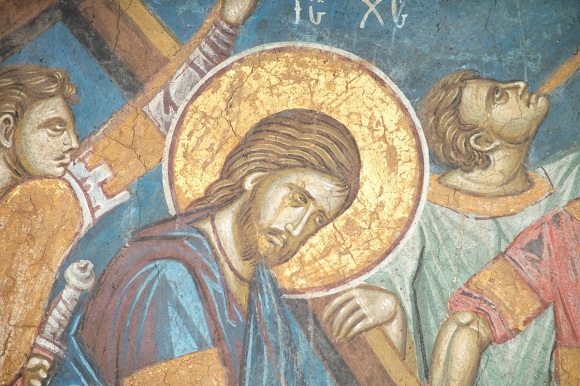
Does God want us to be happy all the time? Can suffering be prevented? Is suffering a good thing in and of itself? Fr. Thomas Hopko, Dean Emeritus of St. Vladimir’s Orthodox Theological Seminary, replies to these and similar questions in what follows, excerpted and adapted from an interview conducted by Peter and Helen Evans.
Helen: So often we hear the popular notion that God doesn’t want us to suffer, that God wants us to be happy all the time.
Fr. Thomas: That’s not the New Testament teaching. There is not a word in the New Testament about being happy. Jesus said, if you are to be My disciple, you’ll deny yourself, pick up your cross, and follow Me. That’s the way to get the joy that surpasses human understanding, the joy that no one can take away from you. The choice for Christians is not between joy, fun, and happiness on one side and suffering on the other. There will be suffering. Either the suffering will be redemptive, Godly, and filled with the joy that comes from God, or it will just be misery. That would be a neurotic suffering that, you might say, is simply the suffering of hell.
Jesus never promised anybody a good, happy life in this world.
Take the Apostle Paul. When he had to boast that he really was an Apostle, what did he boast in? He didn’t boast that he had a wonderful human lineage. He didn’t boast even in his mystical experiences. He claimed to have had a vision of the risen Christ – but, when he boasted, he boasted in what he had suffered. He boasted in how much he was beaten and rejected for the sake of truth, for the sake of God, for the sake of how God really is. I think we have to read the New Testament again.
Helen: True, but for people who haven’t read the New Testament but hear someone tell them that “God is compassionate,” couldn’t that be understood as “we shouldn’t suffer in this life”?

Fr. Thomas: If someone said to me “God is compassionate,” I’d remind them that the word “compassionate” means co-passionate or co-suffering. The God Who is compassionate is the God Who suffers with us. He’s not the God Who takes our suffering away in the fallen world. Never forget that the ultimate revelation of God on the planet earth is in the bloody corpse of a dead Jew hanging on a cross in front of the city of Jerusalem, put to death by Gentiles between two thieves, in the most horrible, vile, wretched method by which a person could die – which, according to Mosaic Law, was even cursed. That’s the Christian faith.
Helen: The basic false premise here is that it’s Christian to prevent suffering?
Fr. Thomas: There is no way to “prevent suffering.” In fact, all the saints teach us: the greater the knowledge, the greater the love, the greater the suffering. Because, once you know what goodness and truth and beauty are and then look around you, and even look inside your own self, all you can do is weep. Then, you can really trust in the mercy and forgiveness of God.
Helen: So Christianity tells us to try to alleviate the suffering of others, but not to think that suffering is wrong in the world?
Fr. Thomas: It depends on what kind of suffering you’re trying to alleviate. If there is a person in really agonizing pain and I could give them some medication to ease the pain, or a person lying on the street being trampled on and I ease their suffering by dragging them into my home, putting them into a bed and feeding them – then that’s obviously alleviating the suffering. But if I see someone who says “I’m suffering so I have to take narcotics to ease the suffering” or “I have to get drunk to ease the pain” and I say to them, “OK, here’s a bottle of vodka, don’t suffer so much,” then I’m just adding to their suffering. It depends on what kind of suffering: there is suffering that is redemptive and there is suffering that is just the consequence of sin.
Peter: So it would be better to avoid the suffering by avoiding the sin, but not as OK to just palliate the suffering brought on by sin?
Fr. Thomas: That’s in the New Testament, too. In the letter attributed to Peter, it says, if you suffer as a good person, who is suffering for the sake of what is really right and good and true, the claim is that that suffering is really blessed and that that suffering will even bring you a joy that the world cannot give. But if you are suffering as an evildoer – in other words, because you are rebelling against God and nature – there is no particular merit or value in that suffering. That suffering is simply insane. It’s like beating yourself with a whip.
Peter: So the best way to understand that second kind of suffering is as an indicator that you are doing something wrong and you should repent?
Fr. Thomas: Yes, and Scripture is very, very clear. One of the earliest Christian hymns in 2 Timothy says that, if we have died with Him, we shall live with Him. If we have patiently endured suffering with Him, we shall reign with Him. If we deny Him, He will deny us. If we are faithless, He remains faithful because He cannot deny Himself. The Christian faith teaches that – in this fallen, sinful world – if a person tries to live a Godly life, every evil-doing being, whether they are human or spiritual or satanic or demonic, will be against that person. And that person will, in fact, end up being crucified, one way or another. That is clearly the Christian thinking.
Jesus didn’t come to take our crosses away; He came to give us the power of the Holy Spirit to bear them.
Helen: So, the main confusion is that people look at their problems from a secular attitude, saying to themselves, “My life should be happy here on earth” rather than looking toward the life after this one. Is that so?
Fr. Thomas: Yes. I would also say that not only do people look at life secularly – which I guess would mean with no relationship whatsoever to God – but I think it’s also true to say, especially nowadays, that many people look at the world in a falsely religious way. Not necessarily just secularly. People think that God exists to make our earthly life “happy,” to take away all suffering and pain, to do whatever we want Him to do, that all we have to do is “name it and claim it” and God will give it to us, no matter what it is — health, a good job, a good sex life or, for example, how the human genome project is described. I read it recently on the front page of the New York Times. The director of the project said: “Our purpose is very clear: it is to live a longer, happier, more pain-free, healthier human life before we inevitably die.” Well, many people think that’s a good program. Many religious people think that’s what God is trying to do, too — to make us live a longer, happier, healthier, better, and easier life…
Helen: … and then retire to Florida!
Fr. Thomas: …because we’re going to die and go to heaven anyway. Well that’s not the New Testament, that’s certainly not the Bible. It’s certainly not the teaching of Christian Scriptures. The Christian saints all suffered immensely. The quintessential Christian saint is the martyr. A martyr is a person who dies, who gets killed, while actually forgiving the person who killed them – just as God forgave the persons who sinned against Him. In fact, Jesus even forgave the people who sinned against Him and crucified Him. He said: “Father, forgive them for they know not what they do.” The forgiveness of God and the compassion of God are guaranteed… absolutely!
Helen: Don’t we have to repent first?
Fr. Thomas: I don’t think we have to repent first. God gives us His mercy and forgiveness whether we want it or not, whether we repent or not. But if we repent and we want it, then that mercy is just glory and happiness and a blessed life. But if we resist it… it’s hell! In fact, the fire of hell is not God punishing people. The fire of hell is the presence of God’s love, His mercy and His compassion on people who don’t want it, don’t accept it, don’t think they need it, and don’t even care about it.
Peter: They take it the wrong way, in other words.
Fr. Thomas: Exactly. You can prove this by human relations. If you love me and I hate you or I don’t care about you, then your presence around me is a pain. I’d like to get rid of you if I could. Whereas, if you love me and I love you, too, then that communion is a total joy. I think it’s as simple as that.
Peter: Still, there is a sense that suffering is something beyond our control; it’s something we have to be passive to. Not that we choose suffering, but that when we suffer it is something happening to which we are passive.
Fr. Thomas: I think you’re right there. Suffering, according to the dictionary, means being acted upon adversely and painfully in a way that we did not choose and did not want. On the other hand, you have to go a step further because there is definitely a human phenomenon called masochism where people simply make themselves suffer. I know people who cut themselves with knives and things like that. That person is being acted upon by some powerful “drive” or “compulsion” or “demon” or whatever you want to call it that is forcing them to do this self-inflicted pain.
Excerpted and adapted from renewamerica.com



















